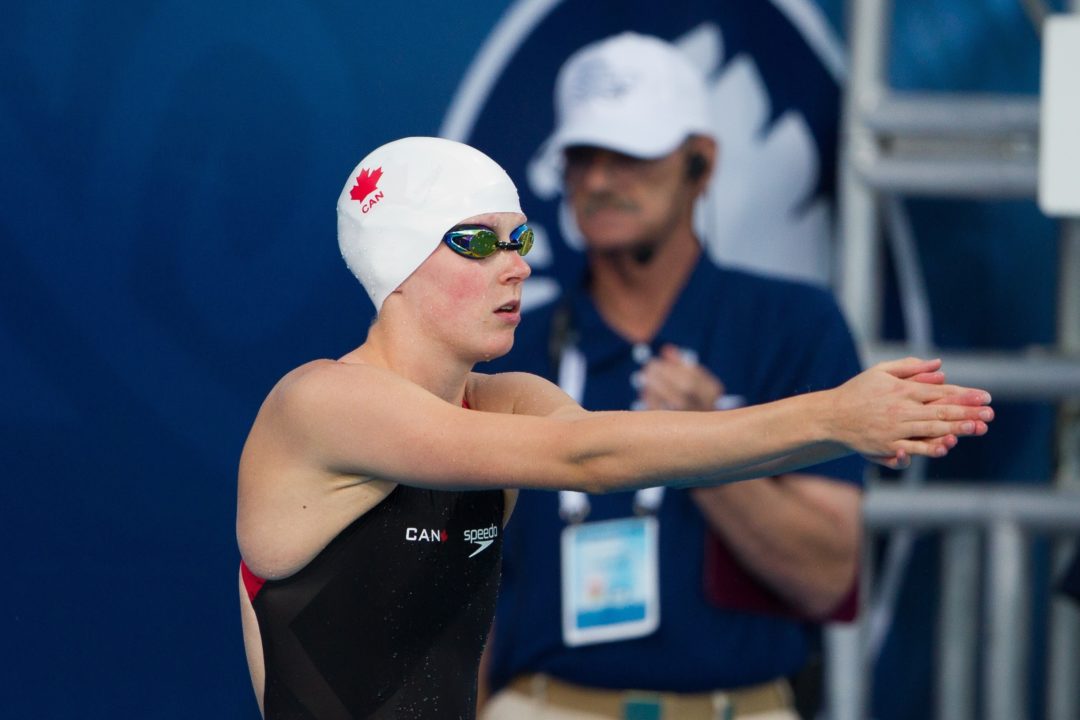Canadian breaststroker Martha McCabe took a huge step forward in her career last week, being selected as an RBC Olympian. RBC Olympians have featured multi-time Paralympic medalist Benoît Huot as well as Canadian record holder in the men’s 100m breaststroke: Scott Dickens.
The RBC Olympians program is designed to benefit athletes by placing them in a workplace environment while supporting their training through funding and flexible hours. The tough schedule that comes with being a high-performance athlete allows for limited job opportunities, making the program very beneficial towards our athletes. Athletes in the program will also be involved in speaking to Canadian communities about success and leadership. RBC receives applications from athletes and picks them accordingly.
McCabe has been an international success in the women’s 200m breaststroke ever since her breakout season in 2009. McCabe came on strong at the FINA World Championships in Rome, making the finals in the 200m breaststroke. In 2011 McCabe proved that her success wasn’t due to the super suits and followed up her strong performance in Rome with a bronze medal at the FINA World Championships in Shanghai. Since Shanghai, medals have eluded Canada’s star breaststroker, but she’s still been a strong contender, qualifying for the finals at both the 2012 London Olympic Games and the 2013 FINA World Championships in Barcelona.
“The number one reason I chose to apply (to the RBC Olympians program) is because I’ve always been keen on keeping my life outside of the pool rolling,” McCabe said. “I find that it benefits my swimming performance, having something to think about when yo go home, but also obviously for when I’m done swimming I don’t want to be left high and dry, I want to have something that I’ve been working on and can continue to pursue”
As an RBC Olympian, McCabe will be speaking at different RBC events about her Olympic journey. RBC will set up different speaking opportunities for McCabe at places like schools, as well as have her speak at RBC functions. Currently she’s working in an office setting about three times a week when she can with very flexible hours.
“I train until about 10 in the morning and have to be back at the pool at three at night. I don’t have many hours in the day to do that (work),” McCabe said.
“A lot of us athletes have these great attributes: we know how to work hard and preserver and face challenges, but we don’t know how to apply those in a business setting,” McCabe said.
The program will help athletes such as McCabe integrate their skills developed by athletic experience into a work environment. Many elite athletes don’t have a lot of job experience due to the high demands of their training; this program allows them to refine their workplace skills.
McCabe recently made the switch to swim in her hometown of Toronto after training for five years with legendary breaststroke coach Jozsef Nagy in Vancouver.
“The biggest influence on my decision to move back to Toronto is that my whole family is there. After being away for five years I started to miss the ease of driving home and having dinner with the family after pracitce,” McCabe said. McCabe is currently swimming with world-class coach Ben Titley, who works at The National Swim Centre at the University of Toronto campus. Prior to his involvement with Canadian swimming, Titley coached in England.
“I feel privileged to be training with Ben Titley,” McCabe said. The two appear to be a good match. McCabe was happy with her results from the last years World Championships which resulted in an eighth place finish in the 200m breaststroke, but knows that there’s more work to be done. Currently McCabe’s best time sits at 2:23.16 from her 5th place performance at the London Olympics. The past couple years have shown great development in the women’s 200m breaststroke, with many swimmers emerging onto the world scene. Most recently Yulia Efimova and Rikke Pederson broke the 2:20 mark at the World Championships in Barcelona, joining American Rebecca Soni as the only swimmers to break that barrier.
“When I hear people talk about my event and they say it’s so crazy, to me it’s not so crazy that those girls are going those times because in my mind those times are very doable,” McCabe responded to comments about the improvement of some of the women in her field. “I’ve been eyeing 2:20 for a really long time so it’s just finding different ways to get to that position.”
McCabe will be attending the Canadian Pan Pac trials in April and assuming all goes well will qualify to swim at the 2014 Pan Pacs in Australia where she will most likely face off against American Micah Lawrence who earned herself a bronze medal in the 200m breaststroke in Barcelona.
McCabe looks to put herself in the race with some of the world’s top performing breaststrokers, “It’s a matter of how I’m going to get there and that’s what I do every day in my training; I try different things.”

And for the non-Canadians reading this, RBC means Royal Bank of Canada. Nice work if you can get it, for an athlete.